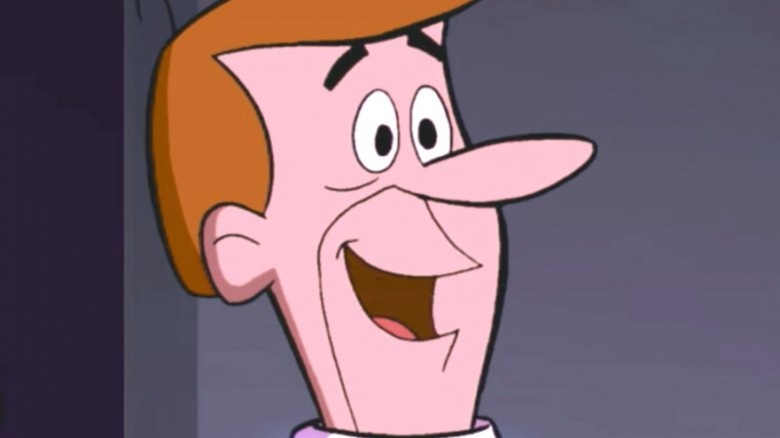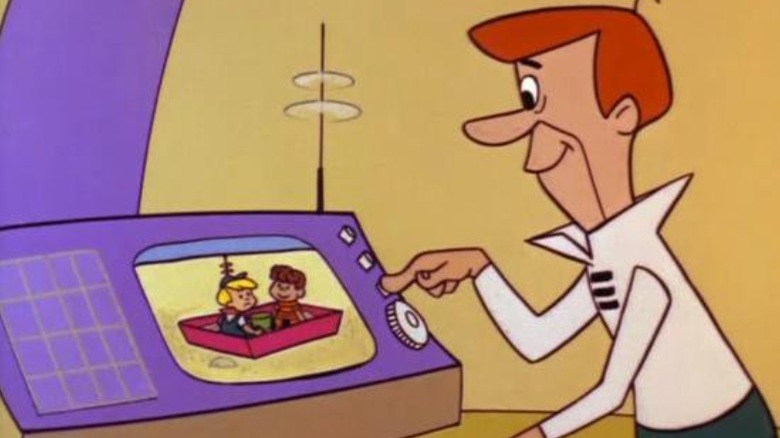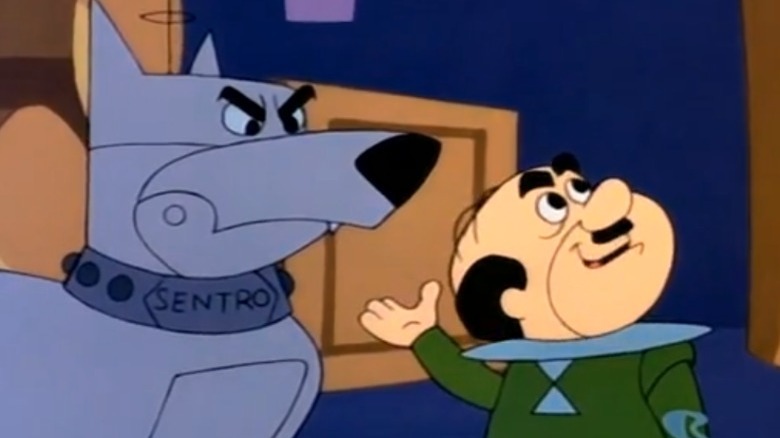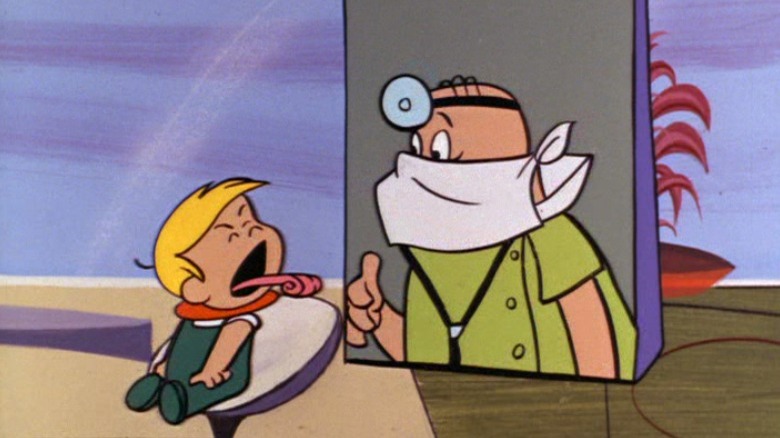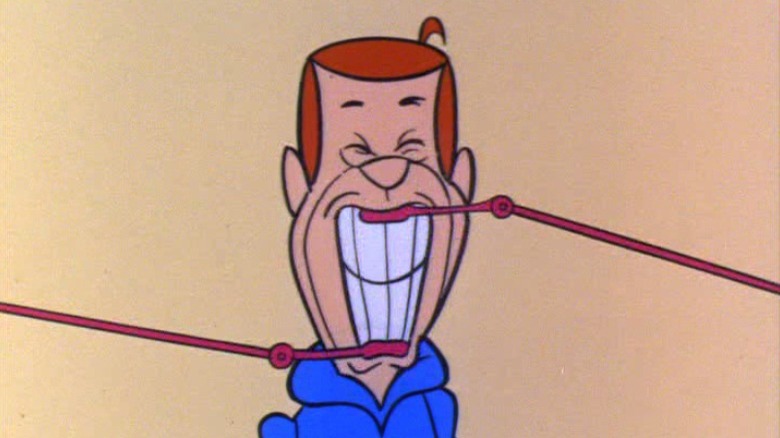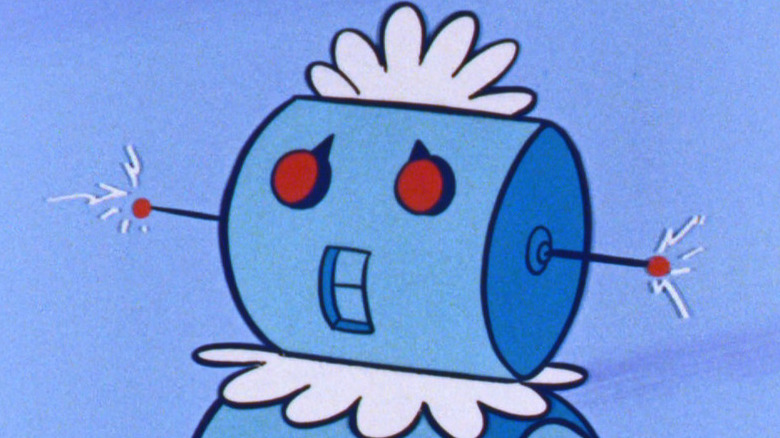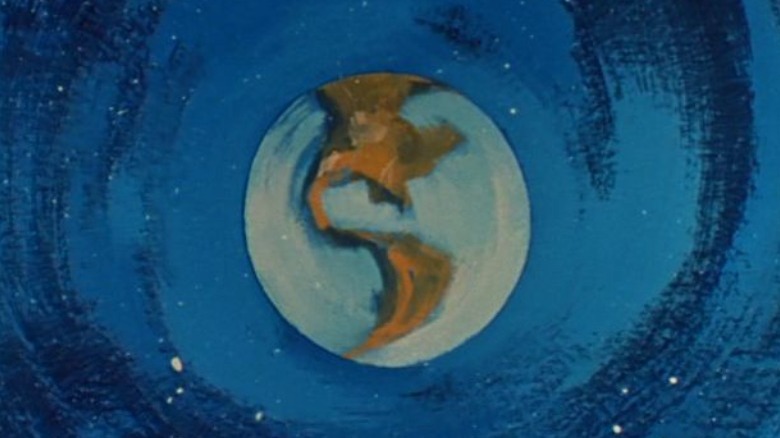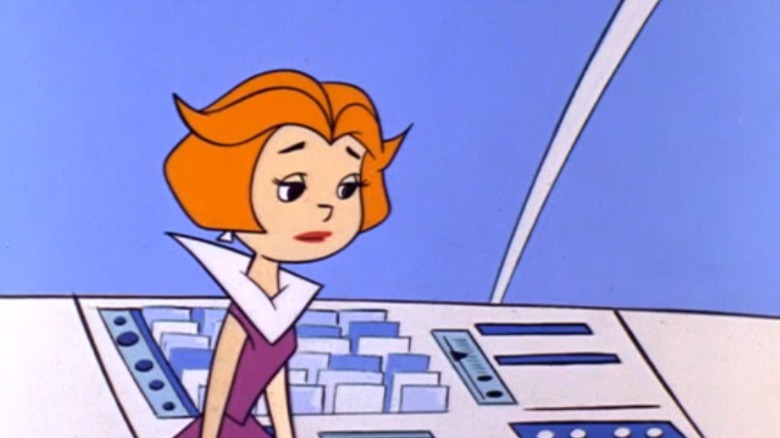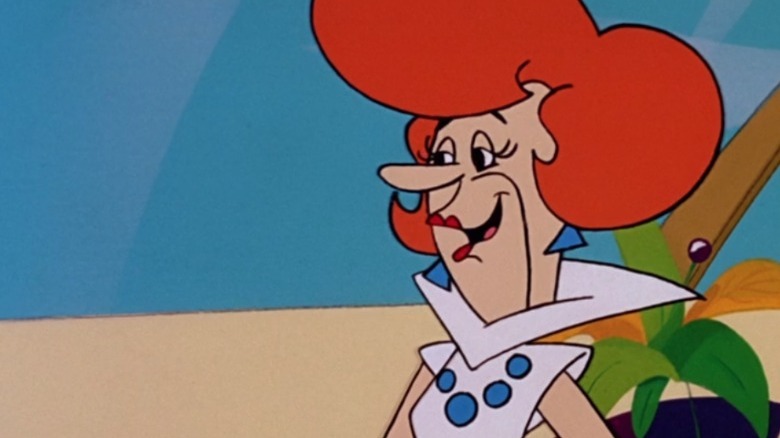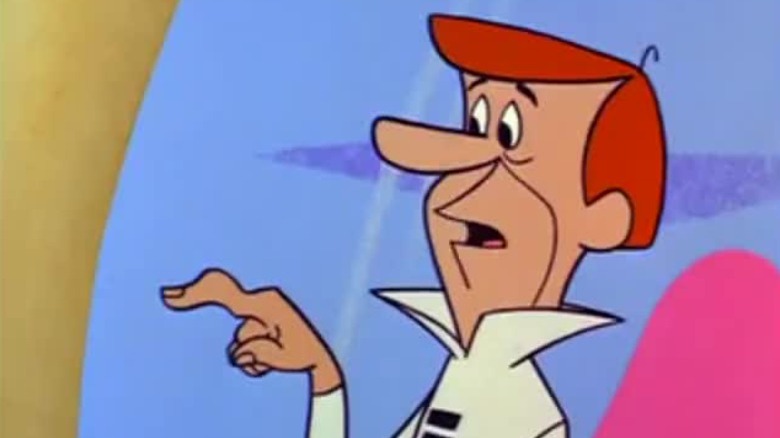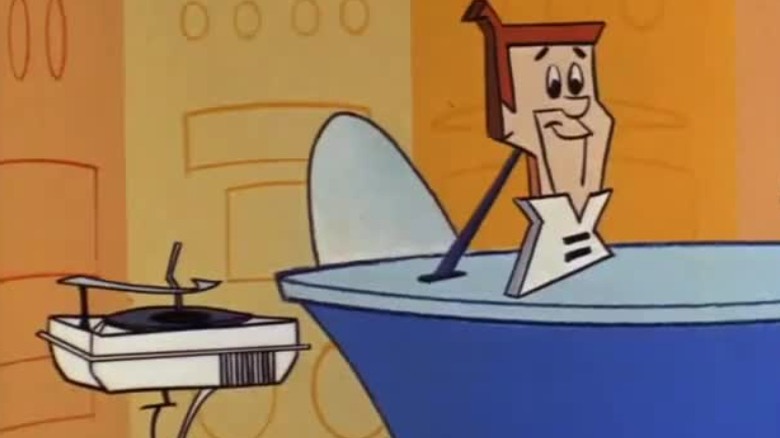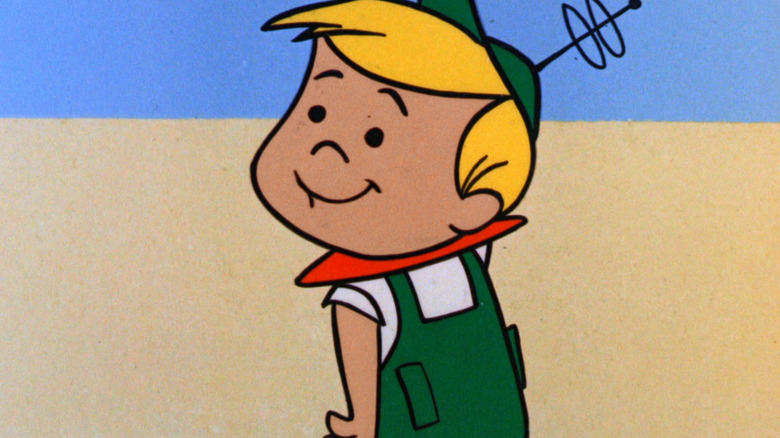Times The Jetsons Were Eerily Correct About The Future
The Hanna-Barbera cartoon series "The Jetsons" is considered the single most important piece of 20th century futurism (Smithsonian Magazine). Set in 2062, "The Jetsons" aired one season of 24 episodes in 1962, then built generations of new viewers through reruns until its enduring popularity inspired two more seasons, which aired from 1985-'87. The show managed to condense 1960s hopes and fears for the future into funny, kid-friendly 25-minute episodes about a nuclear family living in a nuclear world.
The American populace lived with nuclear threat, rapidly accelerating technological advancements, and shifting social structures that left many afraid for the next century. However, "The Jetsons" depicted a lighthearted, colorful, and still deeply human alternative to total annihilation and hell-in-a-handbasket takes. The show inspired yearning for homes high up in the sky, flying cars, and robots in the American psyche, and it's difficult to tell what came first: did "The Jetsons" accurately predict the future, or did we shape the future based on "The Jetsons"?
It may be too late to separate cause from effect, but it's the perfect time to take a look at some of the many ways in which "The Jetsons" was eerily correct about the future.
Computers are everywhere
In 1962, when "The Jetsons" first aired, the concept of a personal computer was brand new. MIT had just designed the LINC, an early example of a 'personal computer' that took up a full table, and it would be another 11 years before the Special Computer APL Machine Portable (SCAMP) was developed by IBM as a personal computer prototype. The concept of computers that could fit on a corner of a desk or in the palm of your hand was a revolutionary notion for "The Jetsons" to present as aptly as it did, adding a desktop computer to every available desk, squeezing screens and 3D TVs into every room, and even adding portable computers in the form of communicator watches and tablet-esque devices.
"The Jetsons" predicted the emotional effects of technology on home, work, and family life eerily well, and hilariously nailed the state of constant accessibility (and annoyance) that comes with incessant video calls in homes, offices, and cars. During 2020's lockdown, people quickly tired of video calls, virtual events, and expectations to be available to work, family, and friends at all times.
Robot dogs: Not just for pets
"The Jetsons" frequently includes robot dogs in its plotlines, ranging from George's attempt to purchase a pet robot dog for the family to an industrial espionage story featuring a K-9 robot dog unit that can fly and take photos. The show eerily predicted that robot dogs would be more than man's other best friend; they would be used as security guards, police and military tools, and generally cast a dystopian pallor.
The reality of modern robot dogs is infinitely scarier, and with more of a "sharks with frickin' lasers on their heads" level of dangerous absurdity. Since 2005, Boston Dynamics has triggered our collective dystopian nightmares as they develop a series of advanced robot dogs capable of feats such as thermal inspection (think Predator vision) and constant video/audio surveillance. Pushback is clear: In 2021, public outcry led the NYPD to cancel a $94,000 contract with Boston Dynamics for robot dogs to patrol the streets of New York City.
Boston Dynamics SPOT robot dogs are capable of useful things like scaling tunnels and sweeping for mines, reading gauges, detecting leaks and radiation, and even assisting in covid-19 response as virtual telemedicine tools. However, headlines like "Robot Dog Not So Cute With Submachine Gun Strapped to Its Back" (Vice, July 2022) are drawing attention to the dystopian side of robotic creatures.
Virtual doc visits and workouts
"The Jetsons" 100% called the modern age of convenient, virtual activities. In the pilot episode, Jane begins her day with a virtual workout on her 3D TV, reminiscent of today's Peloton bikes, Oculus Quest, and virtual workout mirrors (rocketed to popularity by the pandemic). Later in the season, George has to swallow a Peek-A-Boo Prober Capsule (eerily similar to our modern-day Pill Cam) as part of a medical checkup. "You just swallow it and it transmits pictures to a TV screen," the doctor explains. This explanation could easily be used by a doctor in our modern day to describe Pill Cam to a patient.
In Season 2, George attempts to fake being sick to get out of work. Jane suggests a doctor visit, then turns on the 3D TV to reveal a virtual doctor. The doctor diagnoses George's sore throat as "psychologically caused," displaying an openness toward mental health and medical integration way ahead of 1985. It would be two decades before Harvard Medical School showed that virtual appointments could be more efficient and effective than in-person appointments, and public perception of telemedicine began to shift. In 2020, telemedicine became a mainstream practice during the pandemic, and today the convenience of virtual appointments is unlikely to go away.
Technology: Can't live with it, can't live without it
"The Jetsons" depicts upsides of technological convenience (self-serve gas stations, ticket scanners at concerts, and simplified home chores) as well as downsides. George's digital encyclopedia misunderstands him constantly and reads incorrect entries, the automatic door rarely works, and the Food-a-Rac-a-Cycle frequently produces unsatisfactory results. Machines seem to break down just when they're needed the most by humans (a familiar frustration for our modern world). The show highlights how dependence on technology reduces its characters' capacity and abilities — Jane's frequent complaints about how difficult housework (pressing buttons) can be, and George comes home exhausted from a grueling 3-hour workday (to be fair, his boss treats him with such disregard one might assume unions and worker rights are all but forgotten by 2062).
The modern age has similar dependence on technology (smart homes, online shopping, digital payment methods, Googling everything we've ever wondered, GPS, drones) while still working around tech's many shortcomings (Roomba that gets stuck, Siri doesn't understand what was said and calls an ex, self-driving cars that run people over, smartphone and internet addiction spikes over the pandemic, drones). Similarly, our growing dependence on technology and shrinking capacities for independence affect our lives and planet dramatically — for example, we changed from an atlas-reading culture to a GPS-reliant culture in a matter of a decade, and memorizing a phone number would be an unthinkably daunting task today, while it was a common occurrence as late as the 1990s.
Planned obsolescence
"The Jetsons" also called planned obsolescence. When Rosey the Robot needs a new part, the Jetsons learn her model is too old to find one in the Robot stores. Salespeople attempt to upsell them to an entirely new unit, and make it nearly impossible to repair older ones. This is a common issue in modern tech; for example, Apple frequently releases new models and software updates that render older models defunct. Cables for laptops from the aughts are holy grails, difficult to find anywhere but the most obscure sellers. Even if we're attached to our tech, like the Jetsons are to Rosey, we're forced to keep up with constant tech advances.
The increase of e-waste is becoming a global crisis; according to a 2020 article, "Toxic materials from dumped e-waste, such as lead, zinc, nickel and chromium, can get into the soil and water supply, causing lasting harm to people, animals and plants. And the smoke produced by the burning of e-waste leads directly to lung and heart diseases. As for climate change, WorldLoop has estimated that for every 1 metric tonne of e-waste recycled, 1.44 tonnes of CO2 emissions can be avoided." (Forbes, 2020)
However, the future could yet be changed; France has updated its laws to make planned obsolescence a criminal offense, and the EU proposed to update EU consumer rules so consumers have the right to know how long a product is designed to last — and its repair potential.
The intersection of capitalism and climate
Yep, the future is green in "The Jetsons" — cash green. That's right, the Jetsons still use cash (although George does put a fuel charge on credit in Season 2). This prediction is hilariously wrong, but "The Jetsons" was unsettlingly correct to envision a future even more enmeshed in the gears (or sprockets, as it were) of capitalism.
The intro sequence offers a brief glimpse of an Earth that is not green at all; in fact, the landmasses are brown. There are a number of fan theories about what happened to Earth's surface that led society to live above the clouds in the stratosphere in stilted homes, everything from cataclysmic natural events to man-made pollution or nuclear disaster (and even a theory that "The Flintstones" and "The Jetsons" are happening at the same time — the characters in "The Flintstones" are poor and forced to rebuild on the planet's surface after nuclear disaster, applying tech knowledge to stones as a literal lower class, while the characters in "The Jetsons" had the means to escape the surface and live above the clouds, taking "upper class" to a whole new level).
"The Jetsons" avoids addressing Earth's surface, as well as the utter lack of diversity in the stratosphere (everyone is white, or a robot). One could see this as an unsettlingly prescient take on the future of Earth under capitalist, tech-hungry rule. Poor folks and BIPOC communities/countries with fewer resources currently bear the brunt of climate change effects and environmental inequity (BBC, 2022), and it's not difficult to imagine the 1% abandoning the 99% to live above a ruined planet in 40 years.
Patriarchy hasn't changed much
In the summer of 2022, Twitter geared up for the birthdate of George Jetson on July 31. Excitement turned to discomfort once folks figured out George and Jane Jetson's age difference: George is 40, Jane is 33, and their oldest daughter Judy is 16, meaning Jane became pregnant when she was 16 and George was 24. Many wondered why, and a few chalked it up to the views of the era.
"The Jetsons" is rife with patriarchy; the opening sequence frames all characters relative to George ("his son", "his daughter"), depicting Jane "his wife" last. George removes money from his wallet for Jane, who takes the whole wallet and leaves George confounded as she zooms away to a shopping center. Back then, this was a seemingly glib jab at marital life. Today, it reeks of "benevolent sexism." In 1962, women had few rights and little financial independence. Although they'd barely gained the right to open bank accounts in the 1960s, most banks only allowed it with a husband's signature, and refused unmarried women. The Equal Credit Opportunity Act (1974) prohibited credit discrimination based on gender, progressing toward closing the gender equity gap still experienced today.
Today, the oppressive effects of patriarchy mirror "The Jetsons": cartoonishly inept men in positions of power despite female counterparts' superior skills (think of George's cries for Jane to fix malfunctioning tech, or Mr. Spacely's formidable wife); exploiting women for the housework and affection robots can't give, assuming men deserve respect above all. Could this be real life? A study conducted by Ipsos in 2022 shows one in three men believe feminism does more harm than good, and the New York Times released a review in 2020 showing that 80% of officials and executives in positions of power are white, the majority men.
Transphobia hasn't changed much, either
Several episodes of "The Jetsons" rely on transphobia masked as humor. Unfortunately, this mirrors our modern age of thinly veiled bigotry presented as comedy. On the surface, George Jetson in a dress may seem innocuous ... but what's the joke? At its core, it's that men are free to sexually harass non-men, and it's "funny" to see a man objectified and disrespected like a non-man. The humor reinforces harmful stereotypes by assuming (binary) gender dictates how much respect a person deserves.
In Season 2, Episode 3 ("Solar Snoops"), Mr. Spacely forces George to apply for a secretary position at Cogswell's Cogs. George is encouraged to "use your sex appeal" by Spacely when using drag to conduct industrial espionage on the rival company, and Jane gleefully records soundbites for George to use that are frighteningly casual about sexual harassment. It's clear the characters expect and accept uncontrolled, dangerous behavior from men.
Today, we see toxic masculinity lashing out at non-men who enter traditionally male spaces: constant pile-ons of toxic patriarchy, attacks on non-men in STIM and researching fields, disproportionate hatred toward non-men for speaking out about their experiences, and so on. Dave Chappelle's transphobic jokes in his Netflix specials earned him an Emmy nomination, showing that in some ways, our culture has barely evolved from 1962's views on gender and still sees non-men as less deserving of dignity and consideration.
Tech's toll on health
Jane and George frequently refer to "Push Button Finger," a chronic condition in 2062 caused by repetitive button-pushing that leads to cartoonish pulsating and zig-zagginess. Today, repetitive motion injuries caused by tech are new enough that we haven't settled on one name; instead, we use a variety of them. "Trigger thumb" or "tech thumb," "smartphone finger," "texting tendinitis," "texting thumb," "gamer's thumb," and even "selfie wrist" — surprisingly accurate to tongue-in-cheek predictions of "The Jetsons" (NPR). Quality of life is affected by these injuries, and coupled with tech addiction and dependence, these issues can become problematic for our home and work lives (much like Push Button Finger's impact on the Jetsons' mental and physical health). Our culture is adapting to the rise of repetitive motion injuries related to tech, and soon we may have "Jetsons"-style workout routines for button-pushing, swiping, scrolling, and more.
A 2020 study in the National Library of Medicine named potential harmful effects of excessive tech use on mental and emotional health, including heightened attention-deficit symptoms, impaired emotional and social intelligence, technology addiction, social isolation, impaired brain development, and disrupted sleep. Those same symptoms are easy to identify in the social fabric of "The Jetsons": irritation and lack of patience, George's unending lack of emotional intelligence, the family's reliance on tech, and the fact that the Jetsons do not seem to have friends or interact with other humans beyond cursory interactions at work, school, or shopping/running errands. Without going too far on a limb, impaired brain development could be attributed to the poor decisions made over and over again by characters in positions of power — how else do we explain why these characters who can't manage a sandwich are in charge of entire companies?
Records are still in style
"The Jetsons" called the staying power of vinyl records in our culture, painting a vision of the future that incorporates records in its updated tech instead of replacing them. Life imitated art starting in 2006, when vinyl records resurged into popularity. Why? According to Grammy.com, "listeners who found something missing in the digital age once again turned to the tangible format of vinyl records." In today's world, demand for records has increased dramatically in the last few years; in 2019, vinyl accounted for 25.6% of all physical albums sold. Vinyl sales were up by 45% in 2020 (Billboard.com), a reaction to pandemic lockdown and re-emerging hobbies and special interests. Although record production is persistently bottlenecked due to few pressing plants and overwhelming demand, records are no longer considered a fad. Updated tech and furniture that work with vinyl records are on the rise, and records are predicted to have lasting power beyond CDs or digital formats. Barring the "Husband/Records/Toast" Ejector dial Jane uses in "The Jetsons" (when do we get that?), the show presents a surprisingly consistent prediction of how similarly audiophiles would behave from the 1960s to modern day and the future.
Posture gets worse
The characters in "The Jetsons" have posture problems, from George's backward arms to Jane and Judy's Z-shaped figures. In fact, it's impossible to find a character that doesn't seem to suffer from serious posture issues. Perhaps it's inactivity? Finger-strengthening exercises focused on button-pushing seem to exhaust the Jetsons' stamina, and they rely on moving sidewalks in home and work settings. Characters hunch over screens and button panels all day, with eerie similarities to today: The struggle to manage effects of inactivity and chronic tension is evident in our collective hunched shoulders and craned necks. Muscular pain is a growing problem due to "tech neck" or "scrolling neck" caused by excessive smartphone and computer use. A constant barrage of new and upsetting information reaches us in more ways than ever, contributing to long-term muscle tension and cascading ill health effects for modern folks.
In 2062, parks and outdoor spaces are rare and limited to the size of the floating platform that constitutes land. In today's world, options to enjoy the outdoors, such as parks and nature, are becoming a rare luxury for many Americans in suburban or urban settings. Increased pollution and climate risks contribute to staying inside and online more often, and lack of movement contributes to long-term posture problems.
Guard rails are not part of "Jetsons" architecture. Although characters don't seem perturbed by the possibility of falling off a moving sidewalk into the clouds and nothingness below, the subconscious terror of knowing one could fall to their death during routine day-to-day activities would build up harmful, long-term tension. The Jetsons rarely look relaxed, often stressed out by the very technology meant to create convenience. Does that sound eerily familiar?
